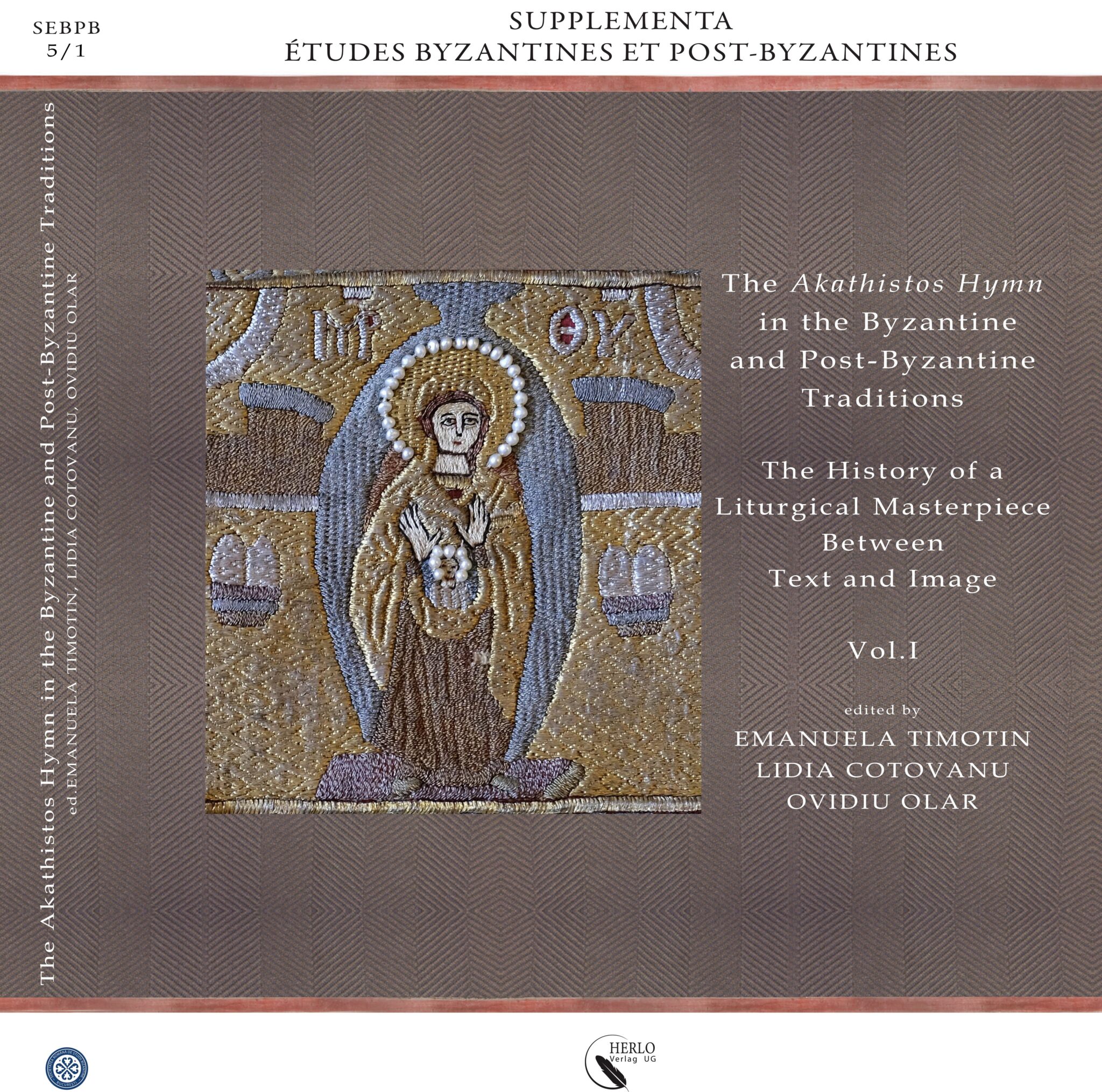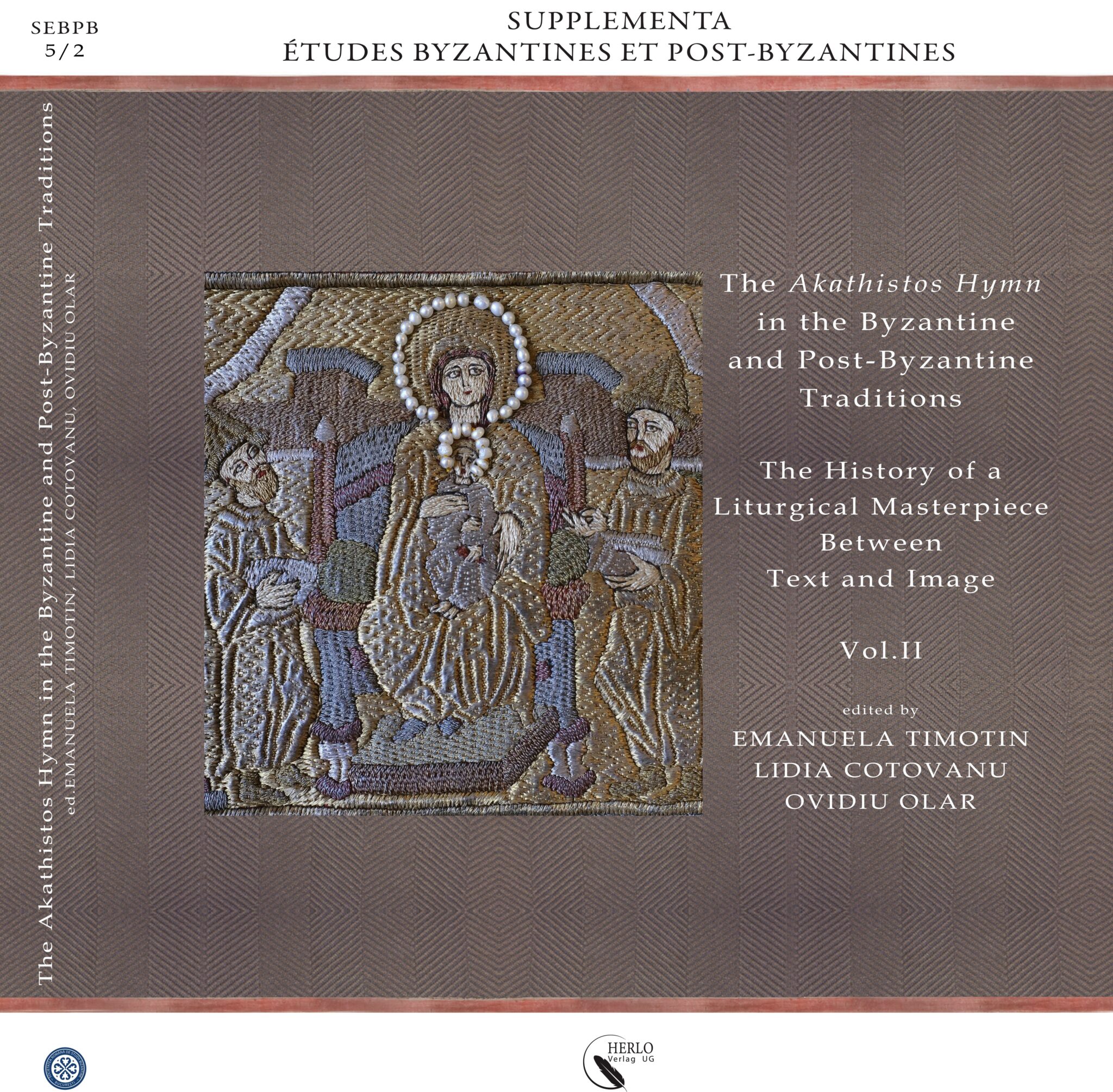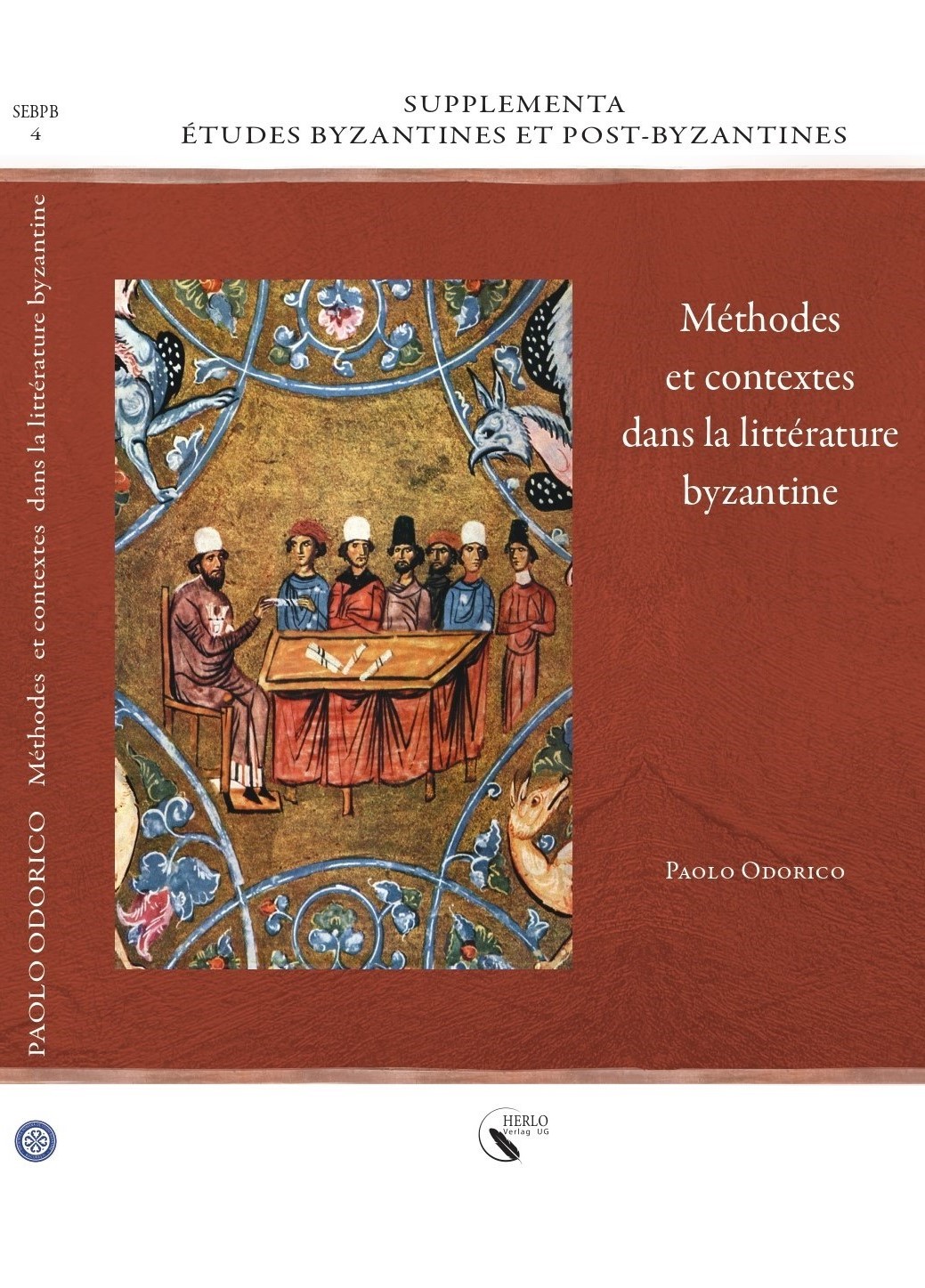Supplementa
Études byzantines et post-byzantines
Launched in 2021
Supplementa Études byzantines et post-byzantines, launched in 2021 and coordinated by Andrei Timotin (editor), is published under the auspices of the Romanian Society for Byzantine Studies. The series publishes state-of-the-art research in Byzantine and post-Byzantine studies undertaken by scholars of Byzantium. The Supplementa is published with Herlo Verlag in Heidelberg.
Vol. 5.1-2, 2024
The Akathistos Hymn in the Byzantine and Post-Byzantine Traditions. The History of a Liturgical Masterpiece Between Text and Image
Editors: Emanuela Timotin, Lidia Cotovanu, Ovidiu Olar
Emanuela Timotin, director of the AKATHYMN project (New Europe College, Bucharest, 2021-2023), is head of the Philology Department at the “Iorgu Iordan – Al. Rosetti” Institute of Linguistics of the Romanian Academy (Bucharest) and chair of the ISFNR Committee on Charms, Charmers and Charming. Her research areas are Romanian philology, charms, and apocrypha. Her most recent book, co-authored with Michael E. Stone, is The Cheirograph of Adam in Armenian and Romanian Traditions. New Texts and Images (Turnhout, Brepols, 2023).
Lidia Cotovanu (PhD, EHESS, Paris) is senior researcher at the “N. Iorga” Institute of History of the Romanian Academy (Bucharest). Her research focuses on the migration flows in South-Eastern Europe, in the 14th-17th centuries. Her monograph Émigrer en terre valaque. Estimation quantitative et qualitative d’une mobilité géografique de longue durée (seconde moitié du XIVe – début du XVIIIe siècle) (Brăila, Istros, 2022, BIESEE 21) was awarded the “Nicolae Bălcescu” Romanian Academy Prize in 2024.
Ovidiu Olar (PhD, EHESS, Paris) is senior researcher at the “N. Iorga” Institute of History of the Romanian Academy (Bucharest) and Principal Investigator of the ERC Starting Grant Orthodoxies and Politics: The Religious Reforms of the mid-17th Century in Eastern and South-Eastern Europe (Institute for Habsburg and Balkan Studies) of the Austrian Academy of Sciences, Vienna, 2022-2026). He has authored La boutique de Théophile. Les relations du patriarche de Constantinople Kyrillos Loukaris (1570-1638) avec la Réforme (Paris, EHESS, 2019). His research interests include the confessional “Cold War” of the 17th century and the history of political ideas.
Description: These two volumes gather papers presented at a conference held at the New Europe College Institute of Advanced Studies in Bucharest, on 13-15 October 2022. The conference was organised in the framework of the research project The Akathistos Hymn in the Byzantine and Post-Byzantine Traditions. The History of a Liturgical Masterpiece Between Text and Image (AKATHYMN), financed by the Romanian Ministry of Education and Research. Specialists in various fields – historians, art historians, philologists, experts in book history and liturgical music – address the textual, visual and chanted tradition of the Akathistos Hymn in the longue durée, with a special focus on its Early Modern history and on its multilingual textual tradition (Arabic, Armenian, Greek, Slavonic, and Romanian).
Contributors: Vlad Bedros, Archim. Policarp Chițulescu, Constantin I. Ciobanu, Lidia Cotovanu, Cristina-Ioana Dima, Armenuhi Drost-Abgarjan, Guoda Gediminskaitė, Nicolae Gheorghiță, Mihail-George Hâncu, Oana Iacubovschi, Roksolana Kosiv, Daniar Mutalâp, Charbel Nassif, Ovidiu Olar, Oksana Shyroka, Emanuela Timotin, Maria Tomadaki, Sister Atanasia Văetiși
Vol. 4, 2023
Méthodes et contextes dans la littérature byzantine.
Recueil d’articles
Author: Paolo Odorico
Editors: Ovidiu Olar, Andrei Timotin
Paolo Odorico est professeur émérite de l’École des Hautes Études en Sciences Sociales de Paris. Il a étudié à Trieste (Italie) et a enseigné en cette université jusqu’en 1995, avant d’être appelé à l’EHESS, où il a fondé le Centre d’Études Byzantines, Néo-Helléniques et Sud-Est Européennes et créé deux collections de livres (Dossiers Byzantins et Autour de Byzance), qu’il continue de diriger. Auteur de nombreuses monographies, il s’est consacré aussi à la diffusion d’ouvrages byzantins par des multiples traductions. Au-delà de ses travaux scientifiques, de l’organisation de congrès et d’écoles d’été, il a dirigé de nombreux étudiants venus du monde entier à se former auprès de lui, direction qu’il estime sa réalisation et son succès le plus important.
Description: Après un premier recueil d’articles publié en Roumanie (Des textes et de contextes dans la littérature byzantine. Un recueil autobiographique d’articles, Bucureşti – Brăila 2013 [Florilegium magistrorum historiae archaeologiae Antiquitatis et Medii Aevi, XIII], 481 p.), le présent volume réunit 18 études représentatives d’un demi-siècle de recherches, de la première étude parue dans les années 70 aux plus récentes réflexions sur la littérature byzantine et ses liens avec la société. Le volume est divisé en deux parties : d’abord une série d’articles censés illustrer la méthode suivie au cours de l’activité scientifique de leur auteur, et ensuite un ensemble d’exemples pour montrer le lien étroit entre production littéraire et société. Si les recherches en byzantinologie ont beaucoup évolué pendant ces cinquante ans, elles n’ont pas toujours porté l’attention nécessaire aux textes comme outils de transmission du savoir (notamment la culture de la syllogè), et surtout comme porteurs d’un message, très souvent politique. Contre une longue tradition, bien enracinée, qui considère les oeuvres littéraires dans leurs aspects stylistiques ou philologiques sur la longue durée et dans leur reprise des textes de l’Antiquité, ces articles veulent souligner l’aspect d’utilisation immédiate des textes, avant qu’ils deviennent des modèles d’écriture. Un recueil d’articles est toujours un moment de vérification d’un parcours, à la fois de recherche et de vie.
Vol. 3, 2022
Konstantinos Harmenopoulos, De haeresibus
Author: Ioan-Gabriel Alexandru
Ioan-Gabriel Alexandru is a research assistant at the Institute for South-Eastern European Studies of the Romanian Academy and a member of the Romanian Society of Byzantine Studies. He holds a BA in classics and philosophy from the University of Glasgow and an MA in Byzantine studies from the Ludwigs-Maximilian University in Munich. Since 2020, he pursues his doctoral studies at the University of Cambridge (Gonville & Caius College) writing on the emergence of public law in the tenth–fourteenth centuries. His main areas of interest include medieval legal institutions and political rituals.
Description: The present work is the first critical edition and translation (in German) of Konstantinos Harmenopoulos’ short treatise on heresies (De haeresibus) and has originally been submitted to the Department of Byzantine Studies (LMU Munich) for the completion of the author’s MA in the summer of 2020. The extended version seeks to place Harmenopoulos’ heresiological production in the doctrinal context of the fourteenth century, thus trying to answer the question: Why did Harmenopoulos include a heresiological catalogue in otherwise purely legal manuscripts? The present volume also aims to show that the heresiological genre went beyond antiquarian interests especially because the link between heresy and law had severe social and political implications. The author’s contention is that such catalogues were meant to establish filiations between beliefs considered suspect and heresies that were already condemned by secular or canon law, e.g., Manichaeism, Messalianism. In the case of Harmenopoulos’ catalogue, there is no overt antipalamite reference, however, the production of the analysed manuscripts and their historical context, point towards a mild opposition towards the hesychast movement of the 1340s. It was perhaps due to a mild stance against palamism that Konstantinos Harmenopoulos enjoyed such a prolific judicial career after 1351.
Vol. 2, 2021
Defending the True Faith in the Twilight of the Empire.
The Palaeologian Synodicon for the Sunday of Orthodoxy in Its Slavic Translation
Author: Ivan Biliarsky
(with an Annexe by Antonio Rigo, The Tome of Condemnation of the Holy Mountain, beginning of 1345)
Ivan Alexandrov Biliarsky graduated in law (1983) and cultural anthropology (1985) from Sofia University; PhD (1989), Dr. Sci. (2009). He holds the chair of professor of Medieval History at the Institute for Historical Research, BAS and is professor of the history of law and institutions at the Faculties of Law UNWE, Sofia and VFU, Varna. He has published more than 20 books and over 250 articles and studies in almost all European countries, the United States, and Japan. His main areas of interest include medieval law and institutions, political theology, sources and manuscript studies.
Description: The present book contains a study of the most recent variant of the Synodicon for the Feast of the Triumph of Orthodoxy, which is called “Palaeologian.” The Synodicon is a complex work without one final and fixed text. Changes continued to be made as ecumenical and local synods were convened to respond to dogmatic controversies. The text thus continued to grow over time and developed differently in different geographical areas. The French editor of the Greek original text – Jean Gouillard – proposed the now generally accepted division of the Synodicon into three variants, following the different époques and dynasties: Macedonian, Comnenian and Palaeologian. The established opinion was that all the South-Slavic manuscript copies of this work belong to the so-called “Comnenian” variant, but after the discovery of the text in a manuscript from the collection of the Library of Romanian Academy (BAR, Ms. Sl. 307) this view was radically changed. Research resulted in the classification of this witness as “Palaeologian.” Furthermore, based on comparison with this manuscript, the already known Drinov copy (National Library in Sofia, 432) has also been recognised as belonging to the same variant. The Palaeologian Synodicon reflects and presents dogmatic discussions and polemics from the second part of 14th century, related to the hesychast movement in the Orthodox church with its political repercussions. The book presents a detailed study of the textual and historical tradition of the Synodicon and an edition of the text of both known witnesses of its most recent variant, with commentary. Thus, light is shed on the theological controversies during the twilight of the Empire. There is also an appendix with an article by Antonio Rigo, “The Tome of Condemnation of the Holy Mountain (Beginning of 1345).” It contains a very important Greek text of the so-called Hagioretikon gramma that has its textual counterpart only in the Bucharest copy of the Synodicon, published also in this book.

To order the book
Herlo Verlag Publishing House and the SRSB offer the book at the special price of 45 EUR, shipping in the EU included. For orders, request a proforma invoice at office@darksolutions.ro. After the proforma is issued, payment can be made in the bank account RO52BTRLEURCRT0330558301.
The discounted price for orders within Romania is 90 RON. For orders, request a proforma invoice at office@darksolutions.ro. After the proforma is issued, payment can be made in the bank account RO05BTRLRONCRT0330558301. The volume is also available at Doxologia (Iași) and Eminescu (Bucharest) bookstores.
Vol. 1, 2021
Rendre la couronne au Christ.
Étude sur la fin de l’idée impériale byzantine
Author: Petre Guran
Scientific researcher at the Institute for South-East European Studies of the Romanian Academy. His work focuses on religious anthropology applied to Byzantine society and culture. More precisely, he studies the process of mutual influences between theological thought and structures of society and political power in the Byzantine world. Having a BA from the University of Bucharest, he continued with a master’s degree in France and defended his dissertation entitled Sainteté royale et pouvoir universel en terre d’Orthodoxie. Fin du Moyen Age et début de l’époque moderne at EHESS, Paris (2003). He acted as Managing Director for the academic program “First College of European Citizenship: Monasteries and European Identity,” organized by the European Council. He held a DAAD fellowship at the Ludwig-Maximilian University in Munich and a teaching fellowship at Princeton University, Center for Hellenic Studies, 2004-2006. He contributed with chapters to the Oxford History of Historical Writing (2012), the Oxford History of Late Antiquity (2012), and the Histoire de la conscience européenne (2016). He co-edited Héritages de Byzance en Europe du Sud-Est aux époques moderne et contemporaine (2013), Constantin Brâncoveanu et le monde de l’Orthodoxie (2015), and Faith and Community around the Mediterranean. In Honor of Peter R. L. Brown (EBPB 1, new series, 2019). He is the initiator of the educational project Școala de la Bunești.
Description: Une idée-désir hante la Russie et les Balkans à travers leurs Églises et monarchies nationales, que Byzance ne mourût pas le 29 mai 1453, mais survécût en tant que Troisième Rome ou héritage byzantin. Ce livre confirme que Byzance en tant qu’idée ne meurt pas, mais ses représentations du pouvoir changent à tel point au long des deux derniers siècles avant la date fatidique, qu’il n’y a plus d’héritage politique à léguer. De cette transformation naquirent une autre institution universelle, l’Église orthodoxe, centrée sur son patriarche œcuménique, et un espace culturel et géopolitique, l’Orthodoxie. Parmi les innovations iconographiques du XIVe s. une place spéciale reçoit l’icône du Christ empereur et prêtre, vêtu des pièces d’apparat de l’empereur byzantin et du patriarche œcuménique. Cette image éclatante de la fusion des deux fonctions, impériale et sacerdotale, exprime par antithèse la mise en cause de l’idée impériale byzantine, selon laquelle l’empereur vivant était une image du Christ et relance le débat sur la nature des deux pouvoirs à la lumière de la théologie palamite. De la sorte, la monarchie se trouva désacralisée et dépourvue du nimbe ex dignitate officii, alors que les patriarches s’évertuèrent à dépeindre en eux cette image du Christ. La cohérence de cette transformation fut assurée par un groupe de moines théologiens et hommes d’action, amis et disciples de Grégoire Palamas, parmi lesquels l’empereur-moine Jean-Joasaph Cantacuzène et le patriarche Philothée Kokkinos. Les « palamites » accèdent au patriarcat de Constantinople et imposent une réévaluation de l’Empire comme institution accessoire de l’Église. L’idée impériale byzantine, dont les expressions idéologiques remontaient à l’antiquité tardive, se voit démunie de ses raisons d’être avant que la dernière bataille ne soit livrée. De ce mouvement d’idées il résulta que la Troisième Rome n’était pas un Empire, mais tout au plus une Église.

To order the book
Herlo Verlag Publishing House and the SRSB offer the book at the special price of 57.4 EUR, shipping in the EU included. For orders, request a proforma invoice at office@darksolutions.ro. After the proforma is issued, payment can be made in the bank account RO52BTRLEURCRT0330558301.
The discounted price for orders within Romania is 129 RON. For orders, request a proforma invoice at office@darksolutions.ro. After the proforma is issued, payment can be made in the bank account RO05BTRLRONCRT0330558301. The volume is also available at Doxologia (Iași) and Eminescu (Bucharest) bookstores.




